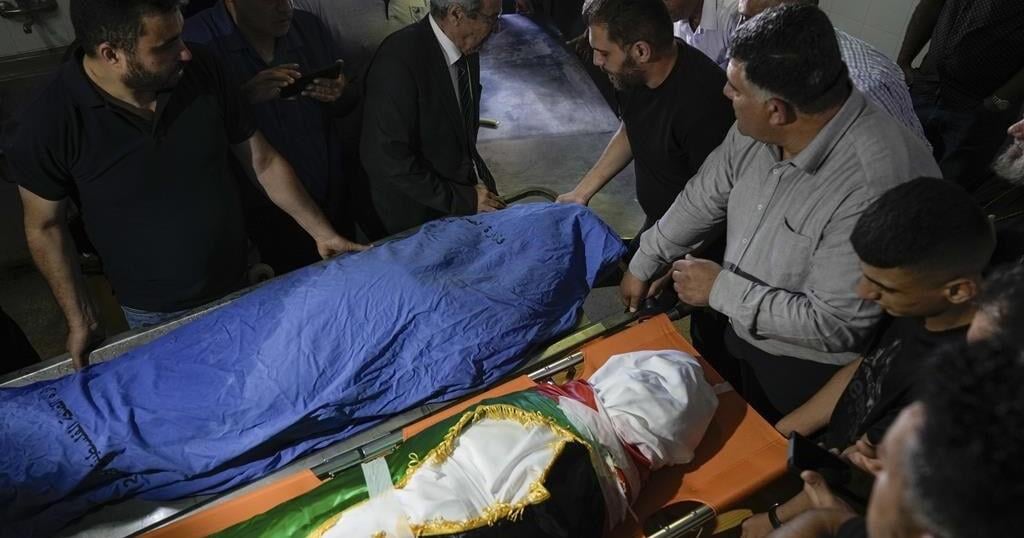DEIR AL-BALAH, Gaza Strip (AP) — Israelis again poured into the streets for another large protest over the government’s failure to secure the return of remaining hostages in Gaza, while hospital and local authorities said Israeli air raids in the territory killed more than a dozen people overnight into Saturday.
Health workers wrapped up the second phase of an urgent polio vaccination campaign designed to prevent a large-scale outbreak. The drive, launched after the first polio case in the Palestinian enclave in 25 years, aims to vaccinate 640,000 children during a war that has destroyed Gaza’s health care system and much of its infrastructure. The third phase of vaccinations will be in the north.
Israel kept up its military offensive. In central Gaza’s urban refugee camp of Nuseirat, Al-Awda Hospital said it received the bodies of nine people killed in two air raids. One hit a residential building, killing four people and wounding at least 10, while five people were killed in a strike on a house in western Nuseirat.
Separately, Al-Aqsa Martyrs Hospital, central Gaza’s main hospital, said a woman and her two children were killed in a strike on a house in the nearby urban refugee camp of Bureij.
In northern Gaza, an airstrike on a school-turned-shelter for displaced people in the town of Jabaliya killed at least four people and wounded about two dozen others, according to Gaza’s Civil Defense authority, which operates under the territory’s Hamas-run government. Israel’s military said it struck a Hamas command post embedded in a former school compound.
The war began when Hamas and other militants attacked Israel on Oct. 7, killing around 1,200 people, primarily civilians. Hamas is believed to still be holding more than 100 hostages. Israeli authorities estimate about a third are dead.
Anger again led large crowds of Israelis into the streets Saturday night, a week after one of the largest demonstrations of the war following the discovery of another six dead hostages in Gaza.
Israel’s retaliatory offensive in Gaza has killed more than 40,000 Palestinians, according to the Health Ministry, which doesn’t distinguish between civilians and combatants in its count. The ministry says more than 94,000 people have been wounded.
Violence has also spiked in the occupied West Bank. A dayslong military operation in Jenin left dozens of dead. “They (Israeli forces) besieged the area and brought in bulldozers. As you see, they destroyed the whole area,” said a resident, Mahmoud Al Razi.
A day after an American protester was shot and killed in the West Bank, her family urged President Joe Biden to order an independent investigation, saying that “given the circumstances of Aysenur’s killing, an Israeli investigation is not adequate.” Their statement called the 26-year-old recent university graduate a “ray of sunshine” and an advocate for human dignity.
Aysenur Ezgi Eygi, who also holds Turkish nationality, was shot in the head, two Palestinian doctors said. She had been demonstrating against Israeli settlements in the West Bank. Witnesses said she was shot during a moment of calm following earlier clashes.
The White House has said it was “deeply disturbed” and called on Israel to investigate. The Israeli military said it was looking into reports that troops had killed a foreign national while firing at an “instigator of violent activity.”
More than 500,000 Israeli settlers live in the West Bank, a territory captured by Israel in 1967. Israeli raids, attacks by Palestinian militants on Israelis and attacks by Israeli settlers on Palestinians have left more than 690 Palestinians dead since the Israel-Hamas war began in October, according to Palestinian health officials.
Israel has been under increasing pressure from the United States and other allies to reach a cease-fire deal in Gaza, but Prime Minister Benjamin Netanyahu insists on continued Israeli control of the Philadelphi corridor, a narrow band along Gaza’s border with Egypt where Israel contends Hamas smuggles weapons. Egypt and Hamas deny it.
Hamas has accused Israel of dragging out negotiations by issuing new demands. Hamas has offered to release all hostages in return for an end to the war, the complete withdrawal of Israeli forces and the release of a large number of Palestinian prisoners, including high-profile militants — broadly the terms called for under an outline for a deal put forward by Biden in July.
Along the border with Lebanon, near-daily clashes continued between Israeli forces and the Lebanese militant group Hezbollah.
An Israeli drone strike hit a Lebanese Civil Defense team fighting a fire in the town of Froun, killing three volunteers and wounding two others, Lebanon’s Health Ministry said. The blaze was sparked by a previous Israeli strike, the statement said. There was no immediate comment from the Israeli military.
Israel’s military said some 45 rockets were fired at northern Israel in several barrages, many targeting the Mount Meron area but falling in open areas. Several rockets fell in Shlomi and around the city of Safed. There were no injuries. The military later said its jets struck Hezbollah military infrastructure and a rocket launcher in the area of Qabrikha in southern Lebanon.
___
Magdy reported from Cairo and Jeffery from Ramallah, West Bank. Associated Press writer Ellen Knickmeyer in Washington contributed to this report.
___
Follow AP’s war coverage at
